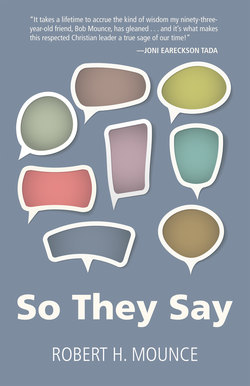Читать книгу So They Say - Robert H. Mounce - Страница 8
На сайте Литреса книга снята с продажи.
Why higher education got lower
ОглавлениеThere was a day when higher education was, as the label suggests, higher. Students went to college to be immersed in an intellectual environment structured around the best that man has said and done since the beginning of reflective thought. The academy existed to discuss ideas, not to provide instructions on how to do something. Those were the golden years of western civilization. Scholars were the ones who encouraged thought and guided it toward goals still in the process of being defined. School was a place for discussion; in fact, the word “school” comes from the Greek schole, “spare time, idleness, a place where leisure is employed for discussion.” People didn’t go to school to be taught something but to discuss something.
The noted Irish poet, William Butler Yeats, would agree. By the time of his death in 1939, American higher education was beginning to look like a vast training program for the industrial world. As a corrective against that direction, Yeats reminded his generation that “education is not the filling of a pail but the lighting of a fire.” For the Nobel winning poet (in literature, 1923) that may seem like an unimpressive aside, but not so. He believed the important issues of life would not be solved by science but by poets able to speak simply. Were he with us today he would be shocked to see the extent to which “pail filling” has replaced serious discussion of concerns that determine the direction of civilization.
And why is it that this mentality has become dominant in our institutions of “higher” education? Could it be that in the short run knowing how to do something is more profitable than trying to understand those issues which in the long run will prove to be significant? We all know that at the moment a young graduate in philosophy may well find himself asking, “Where is the food stamp line?” I feel sorry for those who for a time may have to work at minimum wage or lower, but I feel worse for those who give up the excitement of learning (the “fire” that needs to be lit) for the benefit of having all that doesn’t satisfy anyway.
As members of the biological class called mammals there is nothing we do (with one exception) that is not done far more proficiently by some animal. A shark’s olfactory ability is so great that it can “smell” blood in the water miles away. Setting aside for this particular discussion the theological proposition that man is made in the image of God (I believe it), man is distinguished from other mammals only by an advanced capacity for thought. His frontal lobe is significantly larger and infinitely more complex. Higher education should “set it on fire” by focusing it on issues central to life.
